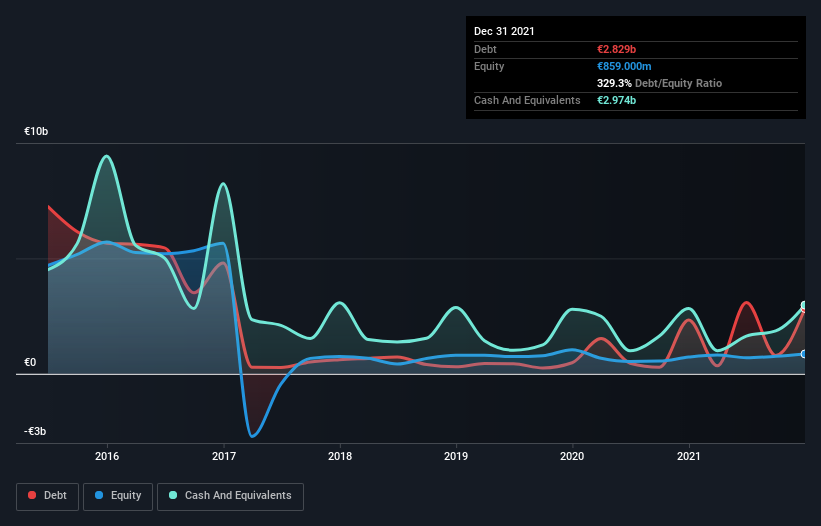
Warren Buffett famously said, 'Volatility is far from synonymous with risk.' When we think about how risky a company is, we always like to look at its use of debt, since debt overload can lead to ruin. We can see that Ceconomy AG (ETR:CEC) does use debt in its business. But should shareholders be worried about its use of debt?
When Is Debt Dangerous?
Debt assists a business until the business has trouble paying it off, either with new capital or with free cash flow. Part and parcel of capitalism is the process of 'creative destruction' where failed businesses are mercilessly liquidated by their bankers. While that is not too common, we often do see indebted companies permanently diluting shareholders because lenders force them to raise capital at a distressed price. By replacing dilution, though, debt can be an extremely good tool for businesses that need capital to invest in growth at high rates of return. The first thing to do when considering how much debt a business uses is to look at its cash and debt together.
See our latest analysis for Ceconomy
What Is Ceconomy's Net Debt?
The image below, which you can click on for greater detail, shows that at December 2021 Ceconomy had debt of €2.83b, up from €2.33b in one year. However, its balance sheet shows it holds €2.97b in cash, so it actually has €145.0m net cash.

How Healthy Is Ceconomy's Balance Sheet?
We can see from the most recent balance sheet that Ceconomy had liabilities of €9.35b falling due within a year, and liabilities of €2.63b due beyond that. Offsetting these obligations, it had cash of €2.97b as well as receivables valued at €2.22b due within 12 months. So its liabilities total €6.78b more than the combination of its cash and short-term receivables.
The deficiency here weighs heavily on the €1.13b company itself, as if a child were struggling under the weight of an enormous back-pack full of books, his sports gear, and a trumpet. So we'd watch its balance sheet closely, without a doubt. After all, Ceconomy would likely require a major re-capitalisation if it had to pay its creditors today. Given that Ceconomy has more cash than debt, we're pretty confident it can handle its debt, despite the fact that it has a lot of liabilities in total.
The modesty of its debt load may become crucial for Ceconomy if management cannot prevent a repeat of the 78% cut to EBIT over the last year. When it comes to paying off debt, falling earnings are no more useful than sugary sodas are for your health. There's no doubt that we learn most about debt from the balance sheet. But it is future earnings, more than anything, that will determine Ceconomy's ability to maintain a healthy balance sheet going forward. So if you want to see what the professionals think, you might find this free report on analyst profit forecasts to be interesting.
Finally, while the tax-man may adore accounting profits, lenders only accept cold hard cash. Ceconomy may have net cash on the balance sheet, but it is still interesting to look at how well the business converts its earnings before interest and tax (EBIT) to free cash flow, because that will influence both its need for, and its capacity to manage debt. Happily for any shareholders, Ceconomy actually produced more free cash flow than EBIT over the last three years. That sort of strong cash generation warms our hearts like a puppy in a bumblebee suit.
Summing up
Although Ceconomy's balance sheet isn't particularly strong, due to the total liabilities, it is clearly positive to see that it has net cash of €145.0m. And it impressed us with free cash flow of €234m, being 197% of its EBIT. Despite its cash we think that Ceconomy seems to struggle to handle its total liabilities, so we are wary of the stock. There's no doubt that we learn most about debt from the balance sheet. However, not all investment risk resides within the balance sheet - far from it. For instance, we've identified 3 warning signs for Ceconomy that you should be aware of.
When all is said and done, sometimes its easier to focus on companies that don't even need debt. Readers can access a list of growth stocks with zero net debt 100% free, right now.
If you're looking to trade Ceconomy, open an account with the lowest-cost platform trusted by professionals, Interactive Brokers.
With clients in over 200 countries and territories, and access to 160 markets, IBKR lets you trade stocks, options, futures, forex, bonds and funds from a single integrated account.
Enjoy no hidden fees, no account minimums, and FX conversion rates as low as 0.03%, far better than what most brokers offer.
Sponsored ContentNew: AI Stock Screener & Alerts
Our new AI Stock Screener scans the market every day to uncover opportunities.
• Dividend Powerhouses (3%+ Yield)
• Undervalued Small Caps with Insider Buying
• High growth Tech and AI Companies
Or build your own from over 50 metrics.
Have feedback on this article? Concerned about the content? Get in touch with us directly. Alternatively, email editorial-team (at) simplywallst.com.
This article by Simply Wall St is general in nature. We provide commentary based on historical data and analyst forecasts only using an unbiased methodology and our articles are not intended to be financial advice. It does not constitute a recommendation to buy or sell any stock, and does not take account of your objectives, or your financial situation. We aim to bring you long-term focused analysis driven by fundamental data. Note that our analysis may not factor in the latest price-sensitive company announcements or qualitative material. Simply Wall St has no position in any stocks mentioned.
About XTRA:CEC
Reasonable growth potential with acceptable track record.


